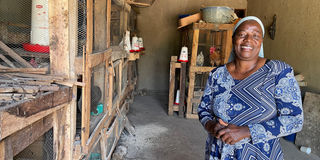Let us not rely on our children for retirement

The poultry project Mariam Buteraba runs. PHOTO | EDGAR R. BATTE
What you need to know:
- We ought to invest to get money and invest more, Mariam Buteraba tells Edgar R. Batte about how she planned for her retirement.
She has been a teacher for the last 34 years. Mariam Buteraba retired last year having taught in two schools, Mengo Senior School as her last work station and Kawempe Muslim Secondary School which she joined in September 1987 when she was in her 20s.
Buteraba attended Buganda Road and Kitagobwa primary schools. She joined Gayaza High School for O-Level after which she joined Nkozi National Teacher’s College for a diploma in Education. “Afterwards, Dr Ibrahim Matovu wanted the teachers at Kawempe to upgrade. We were so many teachers who had pursued diplomas at the time. In 1994, I upgraded for a bachelor’s degree in Education at Makerere University. In May 2018, I was transferred to Mengo Senior School where I retired from,” she explains.
The teacher started thinking about retirement three years ago because so often, she says people tend to become confused on what to do when they retire.
Whereas plans to fulfill retirement are dictated by money, Buteraba says the need to settle and plan was very important because she had to digest the fact that she was no longer going to serve as a public servant.
“If someone does not prepare their mindset, they are bound to be confused. I didn’t want to be confused so I used to tell people that I was born in 1951 and I would be retiring in 2021. And usually the teachers at Mengo S.S would ask, “but hajjat, why do you want to retire when you look younger than your age?” I would respond, “December 25, I will be ready to retire from public service.”
Early preparation
As such, Buteraba was ready for her retirement.
“When I was still a teacher at Kawempe Muslim SS, with fellow teachers, we pooled resources and established Kyadondo Secondary School which laid a good start for retirement.”
Secondly, Buteraba loves rearing birds and she told her children that she would retire into rearing local chicken.
“ I rear 50 birds in my garage. So, we don’t buy eggs, when they are in surplus, we sell. A tray goes for Shs20, 000, money I can use to buy fuel for my car and general home upkeep,” she further explains.
The poultry houses were constructed by her son who studied Woodwork and Technical Drawing at Kibuli Secondary School.
She started with two hens and a rooster. Today, they have multiplied to more than 50. In every cage, is a rooster and four hens from which she gets eggs.
“When you retire, and have a source of income, you will be happier,” she says.
Tips
If you are about to retire, invest in something however small it is.
“You can construct rentals so that you earn a livelihood. Don’t wallow in misery at home because you will age very fast.
Don’t look at children as your all-time support. They also have their problems and responsibilities. Let us not rely on children, but invest to get money and invest more,” she cautions.
The former teacher of English and Geography realised the good in pooling resources, so she also enrolled in a community saving scheme that brings together women in a Sacco called Kubo Lyabugagga Women’s Society. She is the general secretary of the Sacco.
“I would like to see women economically empowered. We are 23 members who began by growing tomatoes and this is our second running. We didn’t get much out of our first running, but we are hopeful. We would like to do fish farming and start a chicken feeds initiative if we get resources,” the retiree discloses.
She adds that the Sacco plans on educating community members, especially women about the need for pooling resources. The members save Shs10, 000 every Saturday. They make sure they save for a year to enable them do individually undertake to fulfil their plans.
“I was talking to a friend who told me about a goat she bought from her savings. We are fighting not to be redundant at home. We have seen that you progress if you have money or run an initiative. We have a member who is ensuring we get funds to do fish farming,” she says.
The 60-year-old adds, “I am looking at keeping my hands and mind busy because people say when you retire, you age faster. but I am not redundant. I still pick my hoe, go and garden and we eat what we farm.”
There is hope for the retirees.





